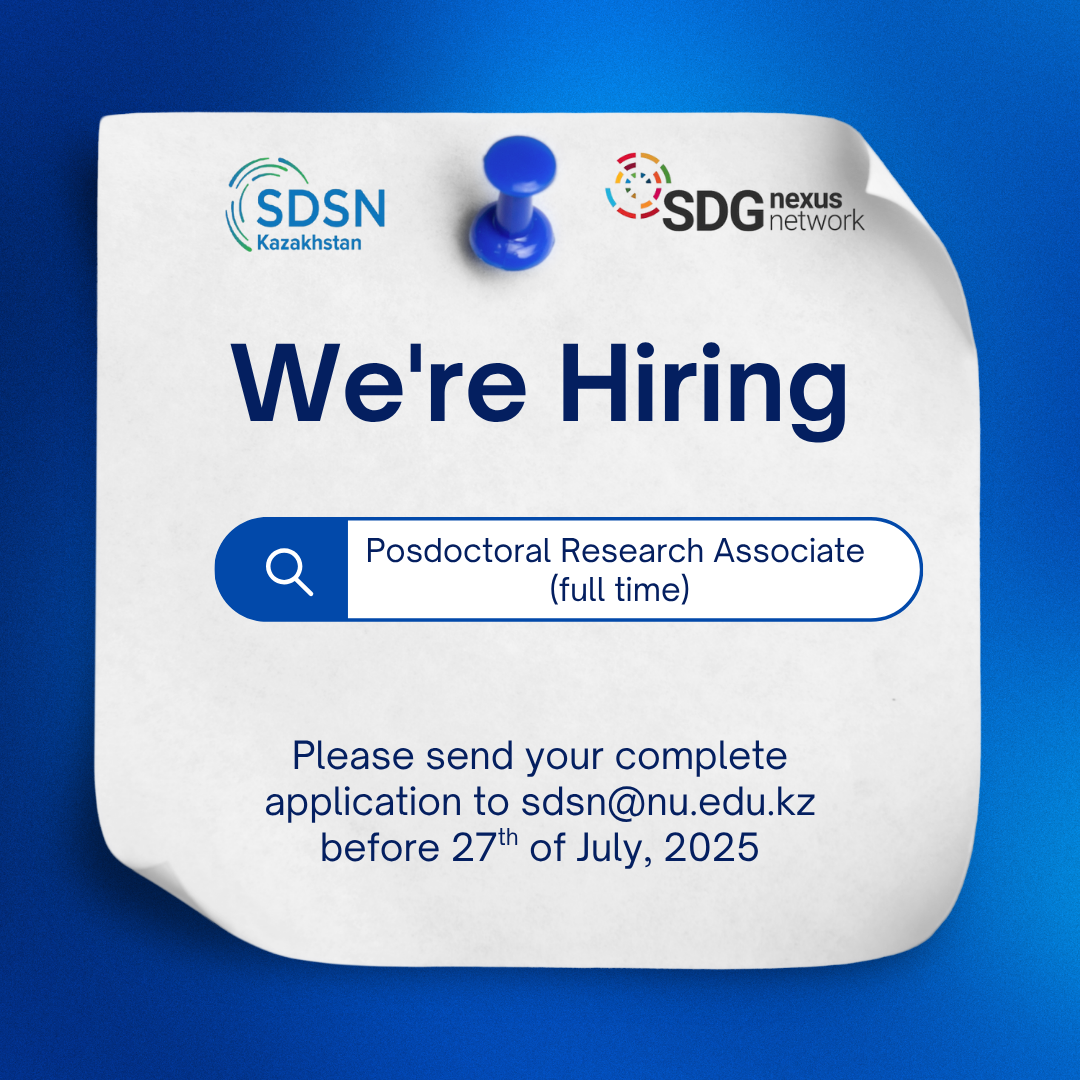JOB OPENING: POSTDOCTORAL RESEARCH ASSOCIATE
AT SUSTAINABLE DEVELOPMENT SOLUTIONS NETWORK (SDSN) KAZAKHSTAN,
NAZARBAYEV UNIVERSITY
SDSN Kazakhstan is announcing a vacancy for a Postdoctoral Research Associate position, to work on the SDGnexus Network Project in collaboration with the Centre for International Development and Environmental Research (ZEU), Justus Liebig University Giessen (Germany). This project is part of a DAAD-funded initiative under the ‘Higher Education Excellence in Development Cooperation – Exceed’ program. The research focuses on advancing knowledge of the interlinkages between the Sustainable Development Goals (SDGs), with an emphasis on Water, Land Use, and cross-cutting themes such as climate change, biodiversity, governance, and gender. Dr. Aliya Assubayeva, Assistant Professor at the Graduate School of Public Policy, serves as the Principal Investigator of the SDGnexus Network project at Nazarbayev University.
We are seeking a highly motivated researcher with demonstrated expertise in addressing water-related challenges within the context of the Sustainable Development Goals (SDGs). The ideal candidate will have a strong research background in one or more of the following areas: water governance and policy, hydrological and coupled human–natural systems modelling, climate–water interactions, the water–energy–food–ecosystems (WEFE) nexus, integrated water resources management, sustainable irrigation and agricultural water use, transboundary water cooperation, or similar areas. Candidates with experience in applying data-driven approaches, systems thinking, or interdisciplinary methods are particularly encouraged to apply.
Location: SDSN Kazakhstan, Nazarbayev University Graduate School of Public Policy (NU GSPP), Astana, Kazakhstan
Type: Full-time research staff
Contract: The position is planned for 4.5 years, until the end of 2029, with annual renewals subject to performance reviews
Compensation: We offer an attractive, internationally competitive remuneration package, along with access to university amenities and opportunities for international collaboration.
Eligibility and requirements
-A PhD in Environmental Sciences, Water Resources Management, Climate Science, Environmental/Agricultural Economics, Development Studies, or a closely related discipline.
-Demonstrated expertise in water-related research aligned with the SDG framework.
-A strong publication record in internationally recognized peer-reviewed journals.
-Demonstrated experience conducting research in interdisciplinary settings, employing both quantitative and/or qualitative methodologies
-Excellent written and spoken communication skills in English; proficiency in academic writing and presenting to diverse audiences.
Duties and Responsibilities
-Conduct independent and collaborative research within the SDGnexus Network framework, with a primary focus on Water, Land Use, and cross-cutting themes
-Lead and contribute to interdisciplinary research publications in reputable journals
-Engage with global and regional research partners to advance joint activities
-Present research at international academic conferences, expert workshops, and stakeholder forums
-Contribute to the preparation of competitive research proposals and funding applications in coordination with senior researchers and institutional partners
-Support SDSN Kazakhstan’s mission through involvement in capacity-building activities, such as student mentorship, training workshops, and multi-stakeholder dialogues
-Assist in the planning and organization of events hosted by SDSN Kazakhstan and the SDGnexus Network.
Application process
Please send your application and/or questions via e-mail to sdsn@nu.edu.kz until 27 July 2025. Applications must be submitted in English as a single PDF file. Only complete applications, with documents in the order listed below, will be accepted:
-Cover letter stating your motivation to apply for the SDSN Postdoctoral Research Associate position (1 page)
-Research proposal (indicating research problem, objective, methodology, and expected outcomes) (max 3 pages)
-Curriculum vitae that includes a list of scientific publications with links to the corresponding journals
-Graduate academic certificates
-Two letters of recommendation to assess your academic achievements (optional)
The SDGnexus Network is committed to increasing the representation of women in academia; therefore, qualified female applicants are encouraged to apply.
Please be aware that we will only contact successful applicants.
As part of the selection process shortlisted candidates will be called for a virtual or face-to-face interview in English.
About SDSN Kazakhstan: Sustainable Development Solutions Network (SDSN) Kazakhstan is a national chapter of the UN SDSN, established in June 2022 at the Graduate School of Public Policy, Nazarbayev University. SDSN is a global initiative launched by the United Nations in 2012 to mobilize scientific and technological expertise to address sustainable development challenges and advance the implementation of the Sustainable Development Goals (SDGs). Currently, SDSN Kazakhstan includes 24 members from leading universities and research centers across the country. Together, these members aim to promote sustainable development solutions, support education and research collaborations on the SDGs, and offer research-based policy recommendations to tackle sustainability challenges in Kazakhstan. The network's research priorities include: Energy and Climate; Education and Partnerships; and Water, Land, and Communities. More information about SDSN Kazakhstan can be found at www.sdsnkz.nu.edu.kz
The SDGnexus Network, consisting of partners from Germany, Colombia, Ecuador, Kazakhstan, Kyrgyzstan, and Uzbekistan, provides a common research framework related to the Sustainable Development Goals (SDGs) of the United Nations and aims to analyze synergies and trade-offs among individual SDGs (SDG-Nexus-analysis). Following a successful first phase from 2020-2024, the SDGnexus Network will intensify its activities in a second phase 2025- 2029. The research concentrates on examining the relationships between individual SDGs, with particular emphasis on Land Use and Water. Climate change and biodiversity as well as governance and gender are seen as cross-cutting themes, linking these two areas of research. A particular focus lays on promoting and connecting the next generation of scientists. Further information about the network can be found at www.sdgnexus.net
